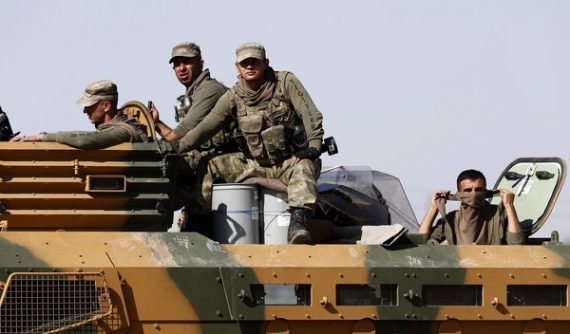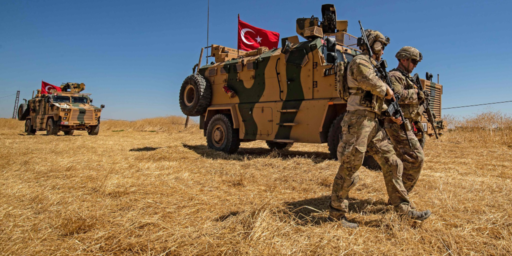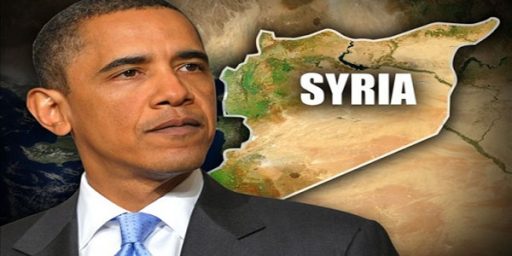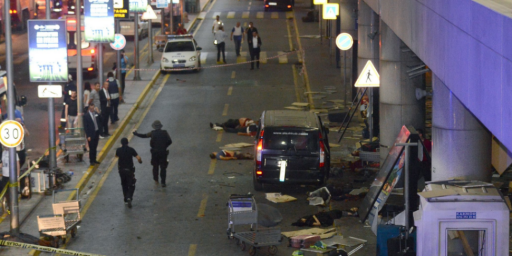Turkey Refusing to Fight ISIS Right on Its Border
A massacre is about to unfold "a stone's throw" from Turkey's border.
A massacre is about to unfold “a stone’s throw” from Turkey’s border.
NYT (“Turkish Inaction on ISIS Advance Dismays the U.S.“):
As fighters with the Islamic State bore down Tuesday on the Syrian town of Kobani on the Turkish border, President Obama’s plan to fight the militant group without being drawn deeper into the Syrian civil war was coming under acute strain.
While Turkish troops watched the fighting in Kobani through a chicken-wire fence, Turkey’s president, Recep Tayyip Erdogan, said that the town was about to fall and Kurdish fighters warned of an impending blood bath if they were not reinforced — fears the United States shares.
But Mr. Erdogan said Tuesday that Turkey would not get more deeply involved in the conflict with the Islamic State unless the United States agreed to give greater support to rebels trying to unseat the Syrian president, Bashar al-Assad. That has deepened tensions with President Obama, who would like Turkey to take stronger action against the Islamic State and to leave the fight against Mr. Assad out of it.
Mr. Erdogan has also resisted pleas to send his troops across the border in the absence of a no-fly zone to ward off the Syrian Air Force.
Even as it stepped up airstrikes against the militants Tuesday, the Obama administration was frustrated by what it regards as Turkey’s excuses for not doing more militarily. Officials note, for example, that the American-led coalition, with its heavy rotation of flights and airstrikes, has effectively imposed a no-fly zone over northern Syria already, so Mr. Erdogan’s demand for such a zone rings hollow.
“There’s growing angst about Turkey dragging its feet to act to prevent a massacre less than a mile from its border,” a senior administration official said. “After all the fulminating about Syria’s humanitarian catastrophe, they’re inventing reasons not to act to avoid another catastrophe.
“This isn’t how a NATO ally acts while hell is unfolding a stone’s throw from their border,” said the official, who spoke anonymously to avoid publicly criticizing an ally.
Secretary of State John Kerry has had multiple phone calls in the last 72 hours with Turkey’s prime minister, Ahmet Davutoglu, and foreign minister, Mevlut Cavusoglu, to try to resolve the border crisis, American officials said.
For Mr. Obama, a split with Turkey would jeopardize his efforts to hold together a coalition of Sunni Muslim countries to fight the Islamic State, also known as ISIS or ISIL. While Turkey is not the only country that might put the ouster of Mr. Assad ahead of defeating the radical Sunnis of the Islamic State, the White House has strongly argued that the immediate threat is from the militants.
But if Turkey remains a holdout, it could cause other fissures in the coalition. It is not only a NATO ally but the main transit route for foreigners seeking to enlist in the ranks of the Islamic State.
Ultimately, American officials said, the Islamic State cannot be pushed back without ground troops that are drawn from the ranks of the Syrian opposition. But until those troops are trained, equipped and put in the field, something that will take some time, officials said, Turkey can play a vital role.
This is a fascinating but hardly surprising standoff. Yes, Turkey’s demands are frustrating, in that they’re a transparent sham. But they thinly disguise a complicated reality that all parties surely understood upon undertaking this campaign.
First, as a predominately Sunni Muslim country, Turkey is in a rather unique position, simultaneously fearful of ISIS’ brutality and contagion effect and yet seeing it as the enemy of its enemy in both the Syrian civil war and the larger regional Sunni-Shiite fight.
Second, given that no other NATO ally—notably and pointedly including its big kahuna, the United States—is willing to commit ground forces to fight ISIS or stop this potential massacre, it’s rather rich to criticize Turkey for taking the same position.
The bottom line, as even President Obama tacitly admitted when he launched this operation, is that ISIS is too well entrenched to be defeated from the air. Quite reasonably, he believes that outcome is not worth the risk of sending in American ground combat troops—which, incidentally, could well be self-defeating, serving as a rallying cry for Islamists in the way the Iraq invasion did. From the beginning, he called for regional forces—he specified the Iraqis, Kurds, and moderate Syrians but hoped others would join in as well—to do the fighting. Thus far, though, it looks like the Kurdish Peshmerga are the only ones who are both willing and able and, as we all knew going in, there aren’t enough of them.
Inevitably, then, calls from the usual circles for the president to reverse himself of sending in American troops will intensify. I fully expect him to demur. But that leaves us with a halfway policy of modest containment. Given the dearth of good options, that’s likely where we’ll be for the foreseeable future.






This is not really surprising. Kobani is for the most part a Kurdish city and the Turks have had their own problems with the Kurds. I doubt the Turks will do anything until they are threatened by ISIL at which point they will have the support of NATO.
Daniel Larison has to somewhere smiling that at least one country in the world has adopted his “Jeffersonian” foreign policy.
All the more reason to stay out. If the locals don’t feel threatened enough to intervene or choose sides, then we have even less of a reason to have a dog in this fight.
On the other hand, I think the Turks are going to regret viewing the Kurds as greater threats than ISIS. Even more than ever, the Kurds’ national desires and capabilities are going to be deepend and strengthened in this conflict. Iraq, Turkey, and Iran will have to confront the Kurds.
@Ron Beasley: It is not simply that they are Kurds. This particular area is dominated by the Syrian mirror of the hardest line Turkish Kurdish separatist party. The Turks are not quite as itchy about other Kurdish areas because their own bugbear is not dominant. More complicated than simply Kurds.
The Turks in this case probably see ISIS destroying a potential threat to the Turkish state in the particular Kurdish militia defending Kobani. And surprise, the Turks (like the Jordanis, Saudis, Kuwait, and Arab gulf states) have interests which might actually be advanced by ISIS victory (Erdogan’s an Islamist Sunni Government, wants to leverage action by Turkey against ISIS to get the U.S. to act against the non-Sunni Assad regime (Alawites, but also other Shia plus Christians and Druze). Of course that will help ISIS!! What a mess. But the Village and imperial elite of Washington and New York have decreed that Oceanea will always be at war with EURASIA. http://everything2.com/title/Oceania+has+always+been+at+war+with+Eastasia
Tell me again why we need to go in and kick the hornets’ nest?
There’s an ongoing massacre in Mexico related to the infighting among the cartels, yet we haven’t invaded to stop it. A willingness to largely ignore what happens on the other side is part of what makes a border a border.
@Stormy Dragon:
An excellent point. When I first read about Turkey’s reticence, I had the reaction of “Why? We would never let that happen.” Then I thought about Cuidad Juarez. While the scale of death isn’t nearly the same (hundreds versus thousands), the principle is.
In 1967, just before the Six Day War started, my wife and I made our first trip together to Europe. We were walking down a street in Brussels when a little elderly man came out of his shop, observed my Jewish physiognomy and American clothes, and asked me in heavily accented English if I was Jewish. I said yes. He glanced at the newspaper headlines predicting an Egyptian victory and noting the disinclination of the US and its European allies to become involved, and said, crying, “It’s going to happen again, and nobody cares.” I tried to reassure him that things weren’t as bad as they seemed, but I didn’t believe what I was saying. A day or so later I read an editorial in a liberal British newspaper saying it was too bad what was going to happen, and suggesting that the British government send ships to rescue Jewish survivors of the war, if any, and trying to find some place for them to live.
As I read the comments in this tread from my fellow liberals I understand even better than before why so many Israelis feel that when it comes to defending themselves they shouldn’t count on the outside world. And why so many Palestinians feel the same way.
I suspect the administration has decided that If Turkey has no problems with IS as a neighbor there isn’t much we can do. That if the entire region, millions of Sunnis, are unwilling or unable to organize themselves well enough to tackle this problem then an solution we impose would be built on a foundation set on sand.
Turkey may change it’s collective mind though. It seems to me Erdo actually believes this to be the easy way out, and events may prove that assumption incorrect.
@Stormy Dragon: excellent point, but taking into account that both borders in question are permeable, it is far from comforting
I guess what really bothers me about this whole discussion is that, contrary to what I keep hearing, there are indeed “boots on the ground” that are willing to take on ISIS. They are Kurds, both in Syria and Iraq. Yet the US arms the Iraqi government and the FSA, rather than the Kurds. That just seems stupid. If Turkey won’t be the “boots on the ground”, then I don’t understand why we should care about their sensitivities vis-a-vis the Kurds. Get the Kurds the tools they need to do the job! The governments of Iraq and Turkey (and Syria obviously) are not our allies – the Kurds are.
@LaurenceB:
The Turks are blocking aid from reaching them. The Turks must be shaken off that fence they are trying to straddle, because if they come down on the side of IS it changes everything. Erdo’s demand that the US effectively declare war on Asad before they will act against IS is obvious BS.
I have a wee bit of sympathy for their dilemma, having been IS’s main conduit to the outside world, however unintentionally, has almost certainly left them hip-deep in sleepers. It will be a mess. A crap sandwich and they are going to have to take a great big bite.